“And think about his kids.” (The man’s two little girls had been with him that day.) “How lucky for them to know this about their father. Anyway, if it was me, even if I never accomplished another thing in life, I’d die happy. I’d have given my son a reason to be proud for the rest of his life.”
Her voice had wobbled a bit as she finished, and Cole’s father addressed the table in a stage whisper: “I think my wife’s had a little too much wine.” And though his mother laughed along with everyone else, Cole knew that later, after the guests were gone, his parents would fight.
“But hold on,” one of the guests said then. “I know what you’re saying, Serena, but I’m not so sure a single incident like that would change a person’s whole life. My guess is people who do heroic things still have the same problems and negative feelings about themselves as they had before.”
“Yeah,” said someone else. “And for some people, like soldiers and firemen, it’s a job, something they do all the time—”
“But that’s different,” Cole’s mother said, her voice rising. “This was just an ordinary guy. It wasn’t his job to run toward danger, and there were other people on the platform that day who did nothing. It’s a whole other level of sacrifice, in my book. Remember that pilot who landed the plane in the Hudson? That was admirable, of course. But I wouldn’t call him a true hero like this other man. I mean, the pilot acted to save himself, too. He wasn’t risking his life for a stranger.”
“This might sound weird,” said a third guest, Cole’s mother’s friend Shireen (the only other woman at the table). “But I’m thinking about what you said about the kids. I can imagine being one of his daughters, or his wife, say, and actually resenting what he did. Like, you’re right, look at the risk he took. Didn’t he stop to think what it would mean to those girls if he were crushed before their eyes? I’ll bet his wife thought of that. I mean, he made a choice, and if he’d gotten killed saving that guy his family might have ended up hating him. Like, how could you put a total stranger ahead of us ? I think it would be perfectly natural for them to feel some kind of anger.”
Addy was right, thought Cole. His mother had been brave. But at the time he hadn’t been proud of her. He’d been angry and frustrated and hurt. Even though she never left him alone for more than an hour or two, and even though during that time he’d usually just sleep—still, he hated her for going. He only had to tell her if he wanted her to stay, she kept saying, but he didn’t want to have to tell her, he wanted her to know how he felt without being told and then just do what he wanted . He was deathly ill, but his stubborn streak was thriving. He didn’t care how bad things were at the clinic. He didn’t care about the other sick people, he cared only about himself. Once when he was alone he woke up dying of thirst. His mother had left a full pitcher of ice water by his bed, but when he went to lift it his arm was too weak and he sprained his wrist, spilling the water all over himself. He had lain there howling in rage and pain and thirst, and he had cursed her over and over. Miles across town she must have heard, for there she was, running up the stairs, taking him into her arms and rocking him, begging forgiveness and promising him he’d be all right. He remembered how hot her body was because her fever had started. And he would blame her for that, too. If she hadn’t insisted on volunteering at the clinic, maybe she wouldn’t have got sick and died.
He hadn’t understood before how much he was still holding all this against her. He’d been told that this was a natural response, but it was hard not to feel ashamed. Whenever he looked back now he hated the boy he had been, especially the way he had treated his parents. In almost every memory he appeared selfish, spiteful, mean. He saw how difficult he had made it for them to love him. He had been heartless and unfair. And then he would think that he had no right to miss them, no right to feel sorry for himself. He who had wished so many times that he were an orphan. Who had cursed his mother over and over. He had not honored his father and mother. He had not loved them enough. They had died at the moment when he was feeling most alienated from them, when he had barely been speaking to them. It was a terrible punishment—like the kind visited upon one of the many bad sons in the Bible stories he was coming to know so well.
In this way, though, he had always understood his mother: he wanted to be the Subway Superman, too.
Later the night of the dinner party, while his parents had fought (“You humiliated me!” “You humiliated yourself!”), he’d logged on to YouTube and watched a video about the man, whose name was Wesley Autrey—the first of many views. Cole had even used Wesley Autrey’s story to create one of his first comic strips. But like everything else that had once belonged to him, it had somehow been lost. In fact, he’d forgotten all about it.
Not just Wesley Autrey’s story but other true-life stories of heroism obsessed him.
In Iowa, a group of Boy Scouts is caught in a tornado. Though injured and in severe pain, one boy struggles to pull his scout mates from under the rubble. Why couldn’t something like that happen to him ? For there seemed no end of such stories on the Net, and the population of heroes his own age was surprisingly large. Here a boy rescued not one but two people from drowning. There a boy helped his mother to give birth. In his neighborhood in Chicago there’d been a boy called Major who’d stopped a whole gang of kids from torturing a dog. The dog, scarred and lame from its ordeal, dragged everywhere behind Major like a broken tail.

A few days after her visit to Salvation City, Addy e-mailed Cole some pictures. One of them showed the light-colored six-story building where she had her apartment in Berlin, in a neighborhood called Prenzlauer Berg. It was the only picture in the group Cole hadn’t seen before. Most of the others were copies of photos his mother had sent to Addy over the years. There were some baby pictures, including one taken by his father immediately after Cole was born, and there were several school pictures. In some of the photos he was by himself and in others he was with friends or parents or grandparents. There was a picture of him with Sadie when she was a puppy, another of him and his dad at a Cubs game. In the most recent photo, he and his parents were standing outside their building in Chicago. It was snowing. It was their last Christmas together and Addy was visiting; that would have been Addy behind the camera. There were also pictures of his parents without him (more of his mother than of his father), some taken years before Cole was born. It was a picture of his mother when she was a little girl (same eyes, much curlier hair) that brought him the greatest emotion.
It wasn’t until he saw these photographs that Cole understood his fear was real: he was starting to forget what his parents had looked like. Recently he had tried drawing them from memory but had given up in frustration. He was thrilled to have the photos now—for one thing, he could use them for drawings—though every time he looked at them he suffered fresh pain. He would never see his parents alive again. There had been no mistake—they would not rise from the dead as he and Addy had done. But something had changed. Disturbing as Addy’s visit had been, it seemed to have quieted some storm in him. It was as if in some way she had given his parents back to him. At least, they felt closer than they had before. He was still their son. They were gone, but they were still his parents. He did not need any others.
Читать дальше













